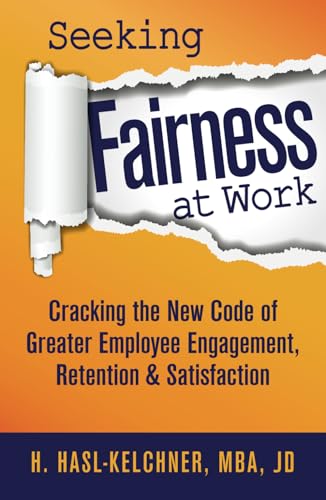
Seeking Fairness at Work: Cracking the New Code of Greater Employee Engagement, Retention & Satisfaction
Book Description
Fairness at work isn’t just an ideal; it’s the secret weapon to transforming the modern workplace. In "Seeking Fairness at Work," Hanna Hasl-Kelchner unlocks a groundbreaking approach that merges employee engagement with authentic satisfaction. Say goodbye to outdated practices and hello to vibrant, thriving teams ready to propel your organization forward. With a powerful blend of compelling research and practical strategies, this book reveals how to create an environment where everyone can flourish. Will embracing fairness become the ultimate game-changer for retention and productivity? Discover the code that could redefine the future of work.
Quick Book Summary
"Seeking Fairness at Work" by Hanna Hasl-Kelchner challenges readers to rethink traditional workplace dynamics by placing fairness at the center of employee engagement and retention strategies. The book argues that fairness—when genuinely embedded in leadership practices and organizational culture—is a transformative tool for boosting satisfaction, productivity, and loyalty. Drawing upon extensive research and real-world case studies, Hasl-Kelchner demonstrates how outdated management techniques often overlook or even undermine fairness, leading to disengagement and high turnover. She provides actionable frameworks and tools to help leaders create transparent, equitable, and inclusive environments. Through practical advice, the book empowers organizations to unlock employee potential by prioritizing fairness, ultimately suggesting that the pursuit of fairness is not only ethical but also a strategic advantage for contemporary businesses.
Summary of Key Ideas
Table of Contents
Fairness as a Core Driver of Engagement
Hanna Hasl-Kelchner opens her book by highlighting the persistent challenges in modern workplaces: disengagement, high turnover, and employee dissatisfaction. She argues that past solutions often miss a central factor—fairness. Through compelling stories and research, Hasl-Kelchner makes the case that workplace culture has historically been shaped by outdated, hierarchical models that neglect equity and transparency. By grounding her argument in data, she demonstrates that fairness isn’t just a virtue but a measurable driver of business outcomes.
Redefining Leadership for Modern Workplaces
The author delves into how redefining leadership is essential for fostering fairness. She critiques traditional command-and-control approaches, advocating instead for leaders who model transparency, inclusivity, and ethical decision-making. Hasl-Kelchner presents a roadmap for managers to foster open communication, enabling employees to voice their concerns and participate actively in shaping their work environment. In doing so, leaders not only build trust but also create teams that are more adaptive, innovative, and resilient.
Practical Strategies for Building Equitable Cultures
Central to Hasl-Kelchner’s thesis are the practical mechanisms for cultivating fairness. She outlines strategies such as clear communication of policies, equitable rewards systems, and bias-free decision-making. The book is enriched with actionable tools—such as assessment frameworks and feedback loops—that organizations can readily implement. Hasl-Kelchner illustrates how even minor policy adjustments can dramatically impact perceptions of fairness, reinforcing that fair treatment must be embedded in daily practices, not just company values.
The Relationship Between Fairness and Retention
A major section explores the linkage between fairness and employee retention. Hasl-Kelchner backs her claims with studies showing that employees who perceive fairness are significantly less likely to leave and more likely to feel a sense of loyalty. She discusses how fairness promotes psychological safety, which is essential for addressing grievances before they escalate. The book features examples of companies that reduced turnover and boosted engagement by investing in fair structures and transparent processes.
Transforming Productivity and Satisfaction with Transparency
The work concludes by examining how fairness acts as a catalyst for improved productivity and satisfaction. Hasl-Kelchner urges leaders to prioritize fairness not as a top-down mandate but as a collaborative, ongoing effort. She shows that workplaces characterized by equitable practices outperform peers on key business metrics, underscoring how transparency and inclusion fuel team morale and innovation. The final message is clear: by cracking the code of fairness, organizations can pave the way for sustainable success in a rapidly evolving world of work.
Download This Summary
Get a free PDF of this summary instantly — no email required.





